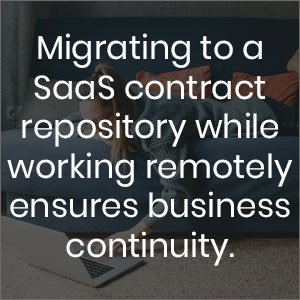Let’s assume you or your legal team need to work from home (WFH) because of the COVID-19 pandemic, a winter storm event, or whenever a family member is unwell. Well, you need to create work from home strategies and guidelines to ensure the continuity of your business.
Your colleagues in sales and marketing have likely been working remotely for years. Many customer service call centers and multi-channel contact centers have been redeployed to interact with prospects, clients, and partners from home, too. Surely, your in-house legal team can do the same – even if it isn’t ready to commit to “telecommuting” on a full-time basis. Half of the American workers had never worked from home before the pandemic.
LEARNINGS FROM COVID-19: Work from Home Strategies
Imagine for a moment what it would be like if governments called for social distancing and self-isolation, and the only way to access business-critical information was in the office, over the local area network. No secure, reliable cloud services. Large capital purchases of commercial real estate might grind to halt or, even worse, jeopardize the well-being of the attorneys and contract managers working in the office. All sorts of chaos might ensue.
When many countries made lockdowns the law of the land, many experienced remote workers – with established home offices – only felt mild turbulence in their work routines. Their office-bound peers, though, needed to adjust to this time of crisis. According to the Society for Human Resource Management, about half of American workers had never worked from home before the pandemic. Because necessity is the mother of invention, many of those same individuals are now working in spare bedrooms, living rooms, and kitchens around the world.
WHERE THERE IS WIFI, THERE CAN BE PRODUCTIVITY
It seems like only yesterday that digital nomads, like freelance writers and web designers, occupied most chairs and tables in coffee houses, demonstrating how simple it is to work remotely. Others worked in co-working spaces or where there was free, accessible WiFi.
Contract managers and other legal professionals don’t have the same flexibility as they would have pre-COVID-19. Yet, they can work remotely and assemble legally enforceable contracts. And these will still move the business forward once the world gets back to a semblance of normal.
If you work in a busy corporate legal office and are used to a certain set of sights, sounds, and distractions, shifting to a WFH setting will take some getting used to. To help you avoid distractions like Netflix or family members who are also WFH, here are some strategies to keep you focused and connected:
- Binaural beats or instrumental concentration music from apps like Calm Radio or YouTube
- Contract-specific messaging through a vendor negotiation portal or virtual meetings through apps like Zoom, Microsoft Teams, or Legaler
- Your preferred digital or physical calendar – an agreement with your spouse and children around your availability
Over-communication with colleagues and other parties to contracts is a good rule of thumb as you work remotely. If you are working virtually with a client who isn’t as well-versed in contract law as you are, try and be as patient and transparent as possible. It could be any type of contract: buy-side, sell-side, or a corporate acquisition offer. Set expectations of how long each contract review cycle should take. And ask the other party to the contract for the same consideration.
PRACTICING SELF-CARE AND SETTING BOUNDARIES FOR YOURSELF
When legal professionals start working remotely, they often find that they work longer hours. This is because they don’t know when to “turn off” and get back to their personal life. But a personal “accountability partner” can help you to work healthy “home-office hours.”
EverydayHealth.com offers more self-care and survival tips for remote working – for newbies and veterans alike:
- Have a sleep schedule – and try to keep to it!
- Wear pants, not pajamas. Shower and groom as if preparing to go into the office. Migrating to a SaaS contract repository while working remotely ensures business continuity.
- Don’t fill your usual commute time with work. Hydrate, walk your dog, exercise, or do yoga.
- Establish a designated workspace.
- Take breaks and eat a real lunch (no, a bag of Doritos doesn’t count). And hydrate some more!
- Connect with your family and friends during breaks, lunch, and hydration. If you give them needed attention when you are resting, they will be less inclined to interrupt you when you’re in work mode.
Let’s face it, each of us adapts to working remotely in a different way. Some exercise exhaustively early in the morning before settling in behind a desk at a realistic hour. Others do not know when to unplug. They find themselves still reviewing business contracts at 2 a.m. And getting too deeply immersed in terms and conditions can drag into the wee hours of the morning.
Also, just because you’re reviewing a legally binding office lease agreement from outside the office, it doesn’t mean that you should assume more risk than usual. Delegate the review of standard Ts and Cs to an AI-augmented contract management platform instead.
Whether you’re living through the pandemic or in a post-COVID-19 world, just know that “working remotely” doesn’t mean “remotely working.” Contract law still applies, and businesses still need to operate as usual.
A contract lifecycle management solution, like ContractPodAi, can extend your contract management and review processes beyond your office walls. It’s a cost-effective way to ensure that business continuity while minimizing those costly business disruptions. It’s great for the morale of those WFH, too.
Author:

Charles Dimov
Connect with us on Linkedin





